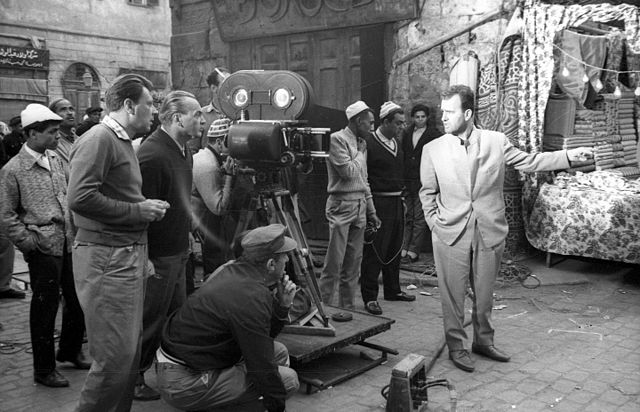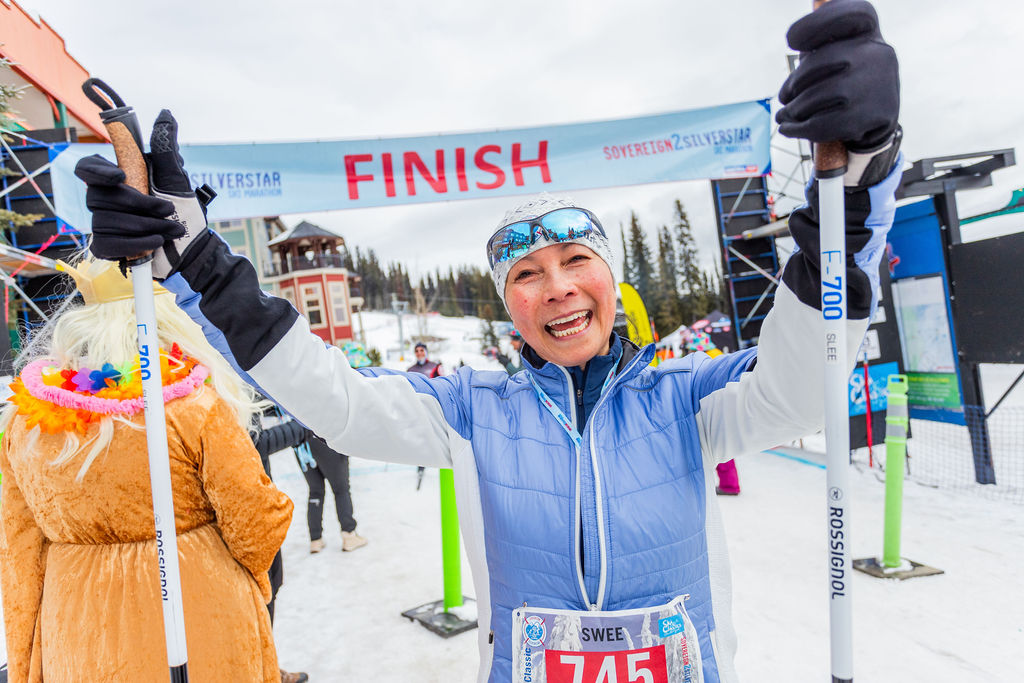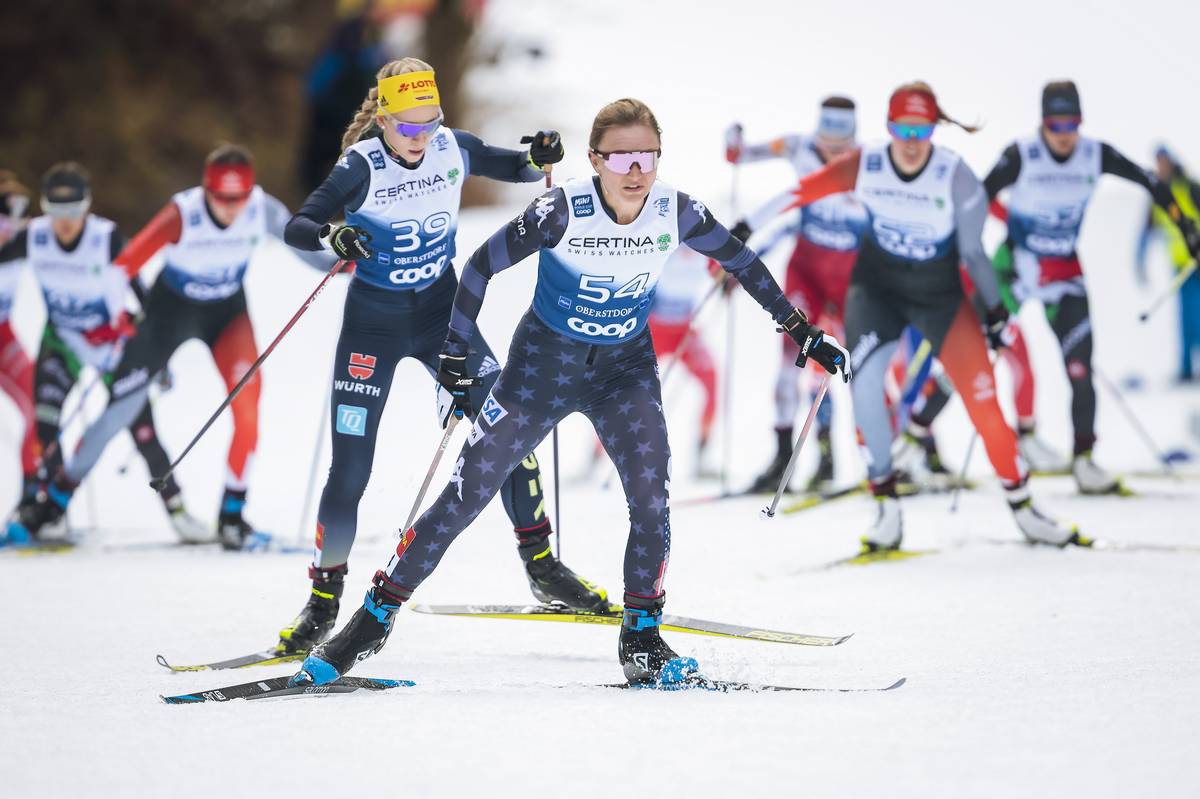
FasterSkier would like to thank Fischer Sport USA, Madshus USA, Concept2, Boulder Nordic Sport and Swix Sport US for their generous support, which made this coverage possible.
PYEONGCHANG, South Korea — Breathe. Exhale.
A generation ago, North American cross-country skiing was a results-sheet afterthought with the exception of the one-off banner day.
Now, with Canada’s Alex Harvey and the U.S. Ski Team earning World Cup wins, podiums, and coveted points, expectations are high. Is it medal or go home?
Not quite. Breathe. Exhale.
On Tuesday night at the Alpensia cross-country venue, North American skiers put on a show. With Jessie Diggins making the finals and Canada’s Len Valjas skiing like he could reel in the ephemeral white whale, spectators and writers alike could also breathe and exhale, knowing good things come around eventually.
Asked in the mixed zone after the race if medals were still in the mix, Diggins turned to the media scrum before walking away and said, “I wouldn’t be racing here if they weren’t.”
In Tuesday’s qualifier, Diggins spearheaded a four-skier women’s U.S. Olympic team that skied one-by-one out of the start in tricky winds and pending precipitation.
Posting the fastest qualifying time was Sweden’s Stina Nilsson, covering the 1.2 k sprint course in 3:08.74 minutes (She would eventually move on to win the event’s gold-medal. Diggins was the leading U.S. skier in qualification, slotting into seventh place, 7.02 seconds off Nilsson’s time. Sadie Bjornsen placed ninth (+7.38) and Sophie Caldwell 12th (+8.32) in a qualifier featuring a 15.28-second spread from Nilsson to 30th-place Aino-Kaisa Saarinen of Finland.
The fourth U.S. starter, Ida Sargent, just missed the quarterfinals in 33rd. She finished 17.06 seconds behind Nilsson’s time.
Three American Women in the Quarterfinals

Diggins selected Heat 3 along with Sweden’s Hanna Falk, an eventual finalist. With her up-tempo double pole, Diggins set the standard immediately.
Into the first climb, which really served as an appetizer for the more significant and steeper climbing meal of the course’s second climb, Diggins took control. There was no doubt watching the speed-frenzy of Falk and Diggins that the sprinting duet would take it to the line, the rest of their heat left behind. It was Diggins-Falk down the final stretch then Falk-Diggins at the line. Falk placed first in 3:11.08, Diggins a camera-click behind in second (+0.16).
Post-qualifier, Caldwell chose the second heat, featuring Norway’s Maiken Caspersen Falla, the day’s second fastest qualifier, and Sweden’s Ida Ingemarsdotter, who placed eighth in qualification.
“During heat selection I have tended to choose some of the first couple heats because it gives me more recovery and they tend to be faster, so I have a better chance of being a lucky loser,” Caldwell explained after the race. “Today I was toying back and forth whether to choose the fifth heat or the second because the fifth didn’t have as many people. But I really like following Maiken. She always sets down a fast heat so I just decided to go with what was working.”
Caldwell, who won the final World Cup sprint — a skate sprint — prior to the Olympics, didn’t need to fix what wasn’t broken. The U.S. Ski Team skier shadowed Falla.
“My strategy was to hop in behind [Falla] and stick with her,” Caldwell added. “And she definitely opened up a bit of gap over the top of the final hill, but I think I skied the downhill well.”
It’s a scorching downhill with a banked sweeping righthand corner that slingshots skiers into the tracks ahead. Down came Falla with a 10-meter gap on Caldwell. But Caldwell’s quick-stepping and gravity defying apex propelled her closer to Falla.
“I started to close in on her and then hopped in her draft on the finishing stretch and was able to finish right behind her,” Caldwell said of closing out her quarterfinal. “That sort of played out perfectly.”
Falla won the heat in 3:11.98, Caldwell was a close second, finishing 0.16 seconds behind.
Bjornsen chose the fourth heat along with Russian Yulia Belorukova and Norway’s Heidi Weng.
One aspect of U.S. women’s skiing that the U.S. Ski Team’s (USST) women’s coach Matt Whitcomb has preached over the years is to go out and take risks; to feel comfortable in the fact that coaches support skiers taking those chances. For the USST women, positive outcome chances have manifested in more confidence and a higher probability of podiums.
Bjornsen went out strong and carried the pacing of the chasing skiers. Her long smooth strides looked settled. In her post-race interview, Bjornsen said she believed the up and down nature of the women’s sprint course required a capacity for endurance.

“I think it’s more distance-type of sprinting,” Bjornsen said.
Bjornsen looked semifinal-bound as she hustled up the decisive climb and Belorokuva made her move over the last portion of the headwall.
But Norway’s Heidi Weng, who had looked uninspired on moving into the climb’s initial ramp, appeared to have learned a lesson from her male teammate, Johannes Høsflot Klæbo. She ran up the outside of the main five-skier group. Belorokuva and Weng punched over the top of the hill in first and second, respectively.
“I probably should have paced it a little bit,” Bjornsen said after the race. “But I was really excited and I just wanted to see what I could do. Man, I was hurting the last 3/4’s of the hill for sure. I was trying to find that next skier and push it hard over the top but yeah probably the best skiing today is to save some energy for the top of that, because that is going to make the difference and your going to see the medals won right there.”
As a third-place finisher in her heat — behind the winner Belorukova and second-place Weng — Bjornsen could have moved on to the semifinals as a ‘lucky loser’ based on time. But her time was not fast enough.

Bjornsen’s big-chance, big-potential-outcome skiing nearly paid off.
“You know, it didn’t go as I dreamed, but the best races I have are when I just go out there and have no fear and send it from the front,” Bjornsen explained. “That was kind of my goal today. I’m not tactically the best skier in the world, but when I have a lot of guts things go well.
“Unfortunately it didn’t work as planned today,” Bjornsen continued. “I hit a bit of a slow patch on that final downhill and lost a position which I really needed but, I am really happy that I tried skiing like that and I definitely have a good feeling and I think there is a lot more to come.”
Bjornsen finished 14th overall.
Caldwell Sends It in the Semis

Despite the semifinal spotlight shining brightest on Nilsson and Falla, in her quarterfinal, Caldwell had proven she could match Falla’s speed burst as the Norwegian closed out the heat. In her semifinal, with Nilsson now playing alpha-sprinter, Caldwell would need to keep in contact up and over the final climb if she hoped of making a finals appearance.
“I think the pace felt a little harder,” Caldwell said of her semifinal. “I haven’t seen times — it could have just been it was one heat later so you are a little more tired. Maiken and Stina really put in a push over the top of that hill, and I feel like that’s where they opened a solid gap. I was hoping I would be able to reel them in on the downhill a little again, but it was just a big enough gap.”
Caldwell nearly caught the Nilsson-Falla train. With the Swede and Norwegian slightly ahead down the final straight, Falk and Caldwell hammered for fast times, hoping for a lucky loser finals berth.
Nilsson won the semi with Falla (+0.03), Falk (+0.62), and Caldwell (+0.80) crossing the line in blur. Falk was the second of two lucky losers to advance. Caldwell was eliminated, missing the lucky loser spot by 0.18 seconds once the times from the other semifinal had been tallied.

“Hanna out-doubled-poled me in the final stretch,” Caldwell said. “It definitely was frustrating being so close to lucky loser, but I was happy with the effort I put in and to be that close was good. I felt good out there, I was a little nervous about how I would feel because I don’t think I slept for a minute last night, I got so nervous.
“I wasn’t even nervous yesterday,” she continued. “As soon I laid down, my mind started racing and I was awake a lot of the night. But I think that’s good, that meant I was excited. I was happy with my feelings out there. I think any day you make it into the semifinal is a good day, and of course you always want more especially at the Olympics. But I think it’s important to take a step back and recognize that that was a really good day and especially for classic sprinting this year it might be my best result of the season, so I am happy.”
Caldwell finished eighth overall, four years after she placed a historic sixth in the freestyle sprint at her first Olympics in Sochi, Russia.
Diggins On the Classic-Sprint Stage
Diggins has made the Olympics her own stage. She nearly pulled out a medal in the 15 k skiathlon last Saturday. Her World Cup season has been peppered with sprint and distance highlights. So a Diggins-charge through the heats, even in a classic sprint, isn’t the story.
The story is that Diggins has set the bar so high that she expects herself to be in these moments; moments of tension where the high-stakes world of sport are cut and dry. Clearly Diggins belongs and it’s an environment in which she has thrived.
In her semifinal, it was a tight 1-2-3 with Russia’s Yulia Belorukova winning in 3:10.12 and Diggins stretched across the line for a photo finish with another Russian, Natalia Nepryaeva. Both skiers finished 0.60 seconds behind Belorukova, however, Diggins placed second, Nepryaeva third. While Diggins automatically qualified for the final, Nepryaeva advanced as well as the first lucky loser.
In the final, Nilsson stole the show with a statement win. She won her first career Olympic gold with an exclamation point. Falla placed second (+3.03), Belorukova third (+3.37), Nepryaeva fourth (+9.14), Falk fifth (+11.16), and Diggins sixth (+11.23).
“For me, just making the final has been a huge step forward,” a self-deprecating Diggins said after the race. “If you told me at the start of the year that I would make the Olympic classic sprint final, I would have been like, ‘Ha, that’s funny, good joke.’ So for me, just having my technique really click this year and having the confidence and the form to make it, has been a really big step forward, and I am really happy and proud of that.”
Having adjusted to the bright light and bump up in media attention on this Olympic stage, Diggins explained it was in fact an extremely taxing series of race efforts as she advanced through the evening.
“For my race today, yeah, I definitely didn’t recover quite enough coming from the second semifinal to the final,” she said. “I don’t know if I would have recovered enough even from the first semi. I had to dig pretty deep just to make it, but I am really happy with where my shape is overall and where my form is.
For sure, I was crumbling a little bit on that last monster climb and working hard to keep it upright and keep it together. But I went at it with everything I had,” she continued. “I really dug deep and I pushed myself hard and I am really really proud of this race today, I think it was a good one and I think it shows some good things to come.”
Women’s cross-country racing continues here in PyeongChang on Thursday with the 10 k freestyle — another Diggins canvas awaiting her brushmarks.
Jason Albert
Jason lives in Bend, Ore., and can often be seen chasing his two boys around town. He’s a self-proclaimed audio geek. That all started back in the early 1990s when he convinced a naive public radio editor he should report a story from Alaska’s, Ruth Gorge. Now, Jason’s common companion is his field-recording gear.



